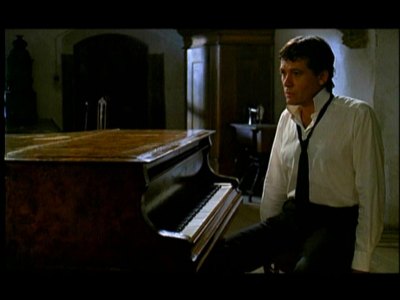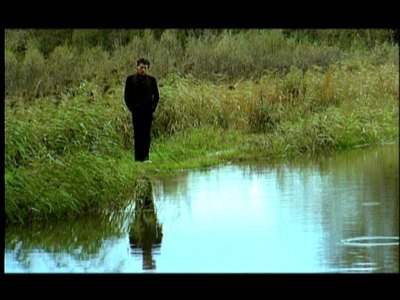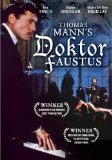| Reviews & Columns |
|
Reviews DVD TV on DVD Blu-ray 4K UHD International DVDs In Theaters Reviews by Studio Video Games Features Collector Series DVDs Easter Egg Database Interviews DVD Talk Radio Feature Articles Columns Anime Talk DVD Savant Horror DVDs The M.O.D. Squad Art House HD Talk Silent DVD
|
DVD Talk Forum |
|
|
| Resources |
|
DVD Price Search Customer Service #'s RCE Info Links |
|
Columns
|
|
|
Doktor Faustus
More of my quotes on the back cover, E1 Entertainment - thank you (now only if my mother knew it was really me...). If you've read my reviews for Buddenbrooks and The Magic Mountain, then you'll know that E1 Entertainment has taken the old Koch Vision disc set, The Thomas Mann Collection, and split the three films up for these new single releases. "New," however, does not extend to the transfers used for these titles - they're the exact same ones used previously by Koch Vision (with all the drawbacks of those transfers, too). So don't double dip if you have The Thomas Mann Collection, but do pick these three films up if you're into the author, or if you're looking for something a little more challenging than your usual fare. Since the transfer for Doktor Faustus is exactly the same as the one I previously reviewed, I'll port that review over here.

Doktor Faustus updates the classic Faust myth to encompass Germany's descent into the nightmare world of WWII. Detailing the life of Adrian Leverkuhn (Jon Finch), a composer who willingly sells his soul to the Devil in order to produce great works of art, Doktor Faustus simultaneously uses that parable to illustrate the decadent decline of Germany's intelligentsia and ruling class, from the culture that produced Beethoven, to the sick society that instigated World War II. Leverkuhn, who comes to music early through a kindly uncle who manufactures organs and pianos, nevertheless goes to college to study theology. Almost instantaneously rejecting the themes and ideas that he's given in his lectures, Adrian returns to his music studies, contemptuously rejecting the status quo in pursuit of a completely different musical idiom, and seeking the "hellish fire" that will fuel his work.
Furthering his descent into moral and physical degradation, Adrian visits a brothel, where he meets the sensuous dark-haired prostitute Hetaera Esmeralda. Afraid of the consequences to his soul if he sleeps with her, he still returns to the brothel six months later, only to find that she has returned home to Sarajevo. Tracking her down, he sleeps with her, despite her warning that she's sick with syphilis. Willfully infecting himself to spite God and to court the Devil, Adrian goes through a series of quack treatments to rid himself of the disease, but fate has determined that he will go through with his half-formed idea of selling his soul for immortality in music. Reaching an epiphany, where he meets the Devil in the snow-capped mountains of Bavaria, he finally agrees to the terms of the deal. His disease will continue, but he won't die from it for 24 years. He will reach fame with his compositions, but he can never love anyone human. He will be unable to find warmth in another human being's love (the devil wants his soul cold when its delivered). What commences is Adrian's inevitable physical and mental decline (both from the disease and from his evil pact), and the disastrous impact his deal has on those close to him. A cello player, a beautiful French set designer, and an angelic nephew will all get too close to Adrian, who suffers the final agony of total knowledge of his wasted life.
Utilizing flashforwards, flashbacks, jump cuts, and mysterious, illogical and unexplained images that tease the viewer, Doktor Faustus's filmic treatment is almost 180 degrees in opposition to the classical formalism of the Buddenbrooks adaptation. This isn't surprising when you see that Doktor Faustus was directed by Franz Seitz, the screenwriter for that other surreal German nightmare, The Tin Drum. While never outrageous or overblown in detailing the spiritual and moral decline of Adrian, Doktor Faustus does have a suitably creepy, inexorable pull to its gravely played scenes. Lead actor Jon Finch (excellent, as always, as he was in Polanski's Macbeth and Hitchcock's Frenzy), despite being dubbed here in German, never overplays the character's inevitable madness and decay. It's a remarkably subtle performance for a role that easily could have lent itself to hamminess or outright parody.
Where Doktor Faustus is less successful is in making the connection between Finch's descent, and the descent of Germany itself into war. Perhaps the theme was too great for the relatively limited scope of the film. Perhaps the personal story of Adrian's pact with the Devil proved too attractive to the filmmakers, and the parallels with Germany's role in WWII were left behind. Either way, a few black and white images of Adrian's friend, hidden in a bunker with the bombs going off, talking about Adrian and Germany having the same fate, aren't enough to make the connection clear. We can guess that the film wants to say something larger about Adrian's devilish pact, and how it mirrors Germany's intellectual and moral decline, but we're never actually shown this connection. Eventually, those flashforwards, however infrequent, become annoying, and we wish the film would stay only with Adrian's story.

The DVD:
The Video:
Strangely, the back of the DVD hardcase holder indicates this film is full-screen, 1:33:1. It isn't (someone needs to either check the copy or learn about aspect ratios). The (unfortunately) non-anamorphic, 1:78:1 letterboxed video image for Doktor Faustus looks far too dark. You can tell it was a beautiful film in the theaters, with obvious care taken with the sets and lighting, but much of that impact is diminished here in the generally soft picture and muted, flat colors. There's quite a bit of grain apparent, and again, just as in Buddenbrooks and The Magic Mountain, there's that distracting PAL to NTSC conversion frame stutter during fast, busy camera movement.
The Audio:
The Dolby Digital mono soundtrack is only adequate (loudness levels are okay), but thankfully, the English subtitles keep pace with the original German dialogue track.
The Extras:
There are no extras for Doktor Faustus.
Final Thoughts:
While the connection between Adrian's physical and spiritual decline, and that of pre-WWII Nazi Germany, may not be as clear as Thomas Mann might have liked, Doktor Faustus does expertly delineate the moral and religious crisis that Adrian goes through in his fateful pact with the Devil. Jon Finch delivers a memorable performance, worthy of your attention. Too bad again that the DVD transfer is not up to the film's own visual standards. I recommend Doktor Faustus.
Paul Mavis is an internationally published film and television historian, a member of the Online Film Critics Society, and the author of The Espionage Filmography.


|
| Popular Reviews |
| Sponsored Links |
|
|
| Sponsored Links |
|
|
| Release List | Reviews | Shop | Newsletter | Forum | DVD Giveaways | Blu-Ray | Advertise |
|
Copyright 2024 DVDTalk.com All Rights Reserved. Legal Info, Privacy Policy, Terms of Use,
Manage Preferences,
Your Privacy Choices | |||||||














